A Night of Transitions at County Board
Washtenaw County Board of Commissioners (March 17, 2010): The theme of Wednesday night’s meeting was one of transitions, as commissioners voted to dissolve the county’s land bank authority, join a regional energy office, and approve a contract for the next county administrator, Verna McDaniel.
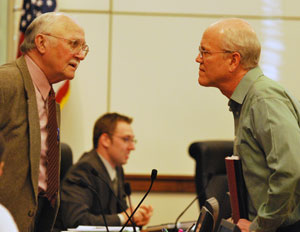
County commissioner Wes Prater, left, talks with Ypsilanti mayor Paul Schreiber before the start of Wednesday's county board of commissioners meeting. Schreiber came to speak in support of the county's land bank. In the background is deputy clerk Jason Brooks. (Photos by the writer.)
Commissioners also got an update from their lobbyist in Lansing, who spoke of upcoming transitions in state government that will impact the county. Kirk Profit said the turnover in the legislature, governor’s office and other administrative posts could lead to opportunities for the county. Several commissioners raised concerns over the state budget and state funding for local programs, and are worried that the situation will get worse before it gets better.
Wednesday’s meeting also included two official farewells to long-time county employees: finance director Pete Ballios and Trenda Rusher, director of the county’s Employment Training and Community Services (ETCS) department. Both received standing ovations from commissioners, staff and others in the boardroom.
Land Bank Authority Dissolved
Despite an appeal from Ypsilanti mayor Paul Schreiber to keep the county’s land bank, commissioners on Wednesday voted to dissolve the entity, which the board created less than a year ago. That decision led commissioner Ronnie Peterson to make a long, impassioned plea for help to aid communities with high foreclosure rates, especially on the county’s east side. Peterson represents District 6, which covers the city of Ypsilanti and part of Ypsilanti Township.
The land bank was championed by county treasurer Catherine McClary, who chaired the authority’s board. It was designed as a way for the county to take possession of tax-foreclosed properties, rather than auction them off to the highest bidder – often an out-of-state company. The intent was to rehab the properties and resell them to qualified buyers, or demolish the houses and use the land for other purposes.
Citing internal disputes and a lack of sufficient funding, some commissioners said they didn’t believe the land bank was an appropriate mechanism for the county at this time. They had discussed their intent to eliminate the land bank last week at a March 10 administrative briefing. [See Chronicle coverage: "County Board to Vote on Folding Land Bank"]
Speaking during public commentary at Wednesday’s meeting, Schreiber reported that the Ypsilanti city council had passed a resolution of support for the land bank. It’s a tool that both Ypsilanti and Ypsilanti Township need, Schreiber said, adding that in his neighborhood alone, there have been four foreclosures in the last three years. He said the land bank could be used in conjunction with the Washtenaw Urban County, which he described as a “fantastic resource.” [Schreiber serves on the board of that group, which is chaired by county commissioner Leah Gunn.] The land bank is another option to help stabilize neighborhoods, he said.
Commissioner Discussion
Conan Smith, who’s been a supporter of the land bank, said he was saddened that they’d reached this point – it was a detriment that they’d have one less tool in their toolbelt. Kristin Judge asked for clarification about the funding – what had the county been hoping to receive to make the land bank more viable?
Leah Gunn explained that the county had applied for a second phase of funding from the federal Neighborhood Stabilization Program, known as NSP2. About $5 million of those funds were to be used for the land bank, but the county did not receive the money. The land bank had also been allocated roughly $300,000 in NSP funds from a previous round that the county has already secured. Those dollars will now be used by the Washtenaw Urban County to rehab blighted properties, working with housing nonprofits like Avalon Housing and Habitat for Humanity.
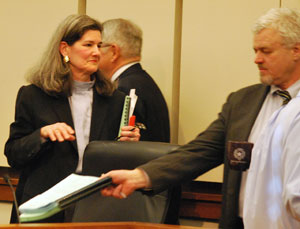
County treasurer Catherine McClary, left, prior to the start of Wednesday's board of commissioners meeting. To the right is county commissioner Ken Schwartz.
Mention of the Urban County led Jessica Ping to note that her district wasn’t urban, and that from her district, only Bridgewater Township was an Urban County member. She wondered why other municipalities weren’t participating.
Gunn clarified that the Urban County is a partnership of the county, the cities of Ann Arbor and Ypsilanti, and eight townships. The “Urban County” designation allows the group to receive and allocate funding through certain federal programs, including NSP. The requirements for NSP stipulate that the funds must be used on certain designated low-income census tracts – locally, those are in southeast Ann Arbor, Ypsilanti, Ypsilanti Township and Superior Township.
However, other federal funds – from the Community Development Block Grant and HOME programs – can be used throughout the county. Joining the Urban County allows local municipalities to be eligible for those funds. Gunn said they’d like for others to participate, and the group has contacted leaders in communities that aren’t now Urban County members, like the city of Saline, which is in Ping’s district. “We’re kind of wooing them,” she said.
Asked by Ping how much it cost to join, Gunn said there is no cost: “We give money away.”
Ping indicated that the name “urban county” was confusing.
The term is a federal designation. From the U.S. Dept. of Housing and Urban Development (HUD) website:
Urban county means a county that was classified as an urban county under 42 U.S.C. 5302(a) for the fiscal year immediately preceding the fiscal year for which emergency shelter grant amounts are made available. “(6)(A) The term “urban county” means any county within which- (i) is authorized under State law to undertake essential community development and housing assistance activities in its unincorporated areas, if any, which are not units of general local government; and (ii) either– (I) has a population of 200,000 or more (excluding the population of metropolitan cities therein) and has a combined population of 100,000 or more (excluding the population of metropolitan cities therein) in such unincorporated areas and in its included units of general local government … ” (42 U.S.C. 5302(a))
Returning to the topic of a land bank, Jeff Irwin said he too was disappointed, but that he would reluctantly support dissolving the lank bank authority. He said the board had lots of questions that went unanswered, and that they’d asked the county treasurer to return to the board with specific strategies for how the land bank would be used. That never happened, he said. When the funding fell through, the land bank’s viability as a tool became less clear.
Irwin said he’d encourage the treasurer to come forward in the future with strategies, and answers to questions like what metrics would be used to judge the land bank’s success, and how long would the county hold property that was put in the land bank.
Noting that he’d had a lot of questions about the land bank, Ronnie Peterson said he never questioned the treasurer’s motives in trying to help the community. He described the devastation that the economic downturn has taken on his district, saying that there are certain neighborhoods where you’ll find stretches of five to ten houses “sitting naked” because they’ve been foreclosed on and abandoned. The county is losing the stability of its neighborhoods, he said, and that stability depends on home ownership.
Both Ypsilanti and Ypsilanti Township had appealed to the board in support of the land bank, Peterson said, and he urged commissioners to table the resolution that would dissolve the entity. He said if they couldn’t work something out by June, he’d support the decision to dissolve it.
Gunn reiterated her point that the Washtenaw Urban County was working on the same issue – rehabilitating homes and working to find qualified buyers, not renters. “That is precisely what commissioner Peterson wants, and that is what we are doing,” she said.
Ken Schwartz weighed in, saying he’d been enthusiastic about the program when they approved it last July. [See Chronicle coverage: "Banking on a Land Bank"] But over the past few months, the board had difficulty working through things like who to appoint to the land bank authority’s board – no appointees were made. Schwartz described the situation as too much “taffy pulling,” but said that if they do more research and analysis, a land bank might be possible in the future, using a more coordinated approach with other tools to address similar problems.
Outcome: At the board’s Ways & Means Committee meeting, the resolution passed with dissent from Smith and Peterson. At the regular board meeting, which immediately follows Ways & Means, only Peterson voted against it – Smith and Schwartz were not in the room during that vote.
Report from Lansing
Kirk Profit – director of Governmental Consultant Services Inc., a Lansing-based lobbying firm – had been asked to give the board a briefing on state funding, which has a direct impact on programs and services provided by the county. Profit and two GCSI staff members – Ken Cole and Adrian Hemond – described some of the legislation they were tracking and attempting to influence, specifically as it related to funding for local municipalities.
Profit, a former state representative, described the situation in Lansing as challenging, though he praised the work of legislators representing Washtenaw County. He noted that the state faces a roughly $1.4 billion budget deficit. Gov. Jennifer Granholm has proposed closing that deficit with $500 million in cuts, $500 million in new revenue and $400 million in federal stimulus funds, Profit said, but both the House and Senate have said no to new revenues (tax increases).
Local governments have already seen an impact from the state’s budget crisis in the form of decreased state revenue-sharing and lower transportation funding for local roads, Profit said. With more cuts to come, he added, the state budget will encroach even more on quality-of-life issues.
Cole and Hemond both described work they’re doing to track legislation working its way through the House and Senate appropriations committees and subcommittees. There wasn’t much good news to share, with potential cuts in jail reimbursements, public health, the state police budget – which would affect local secondary road patrols – and other areas.

Kirk Profit, whose Lansing-based firm is a lobbyist for Washtenaw County, talks with county commissioner Barbara Bergman before the start of the March 17 board of commissioners meeting. Profit and two of his staff members gave an update on state legislative issues.
Profit mentioned a range of other projects that GCSI is pursuing, including legislation related to the Detroit Region Aerotropolis – the county is a partner in that project – and an effort to eliminate unfunded state mandates. He also said that outgoing county administrator Bob Guenzel will be working with GCSI on a project aimed a restructuring local government.
Though Profit described this year as a time to be engaged, he cautioned that because of the upcoming elections and a change in leadership at all levels in Lansing, it’s likely that a lot of issues won’t be resolved. There’s not much incentive for current legislators to make structural changes, he said. However, he added, “with a new government comes opportunity.” As a transition occurs and appropriations are made, it’s time to promote the county’s agenda, he said – or someone else will promote a different one.
Commissioner Discussion
Several commissioners had comments and questions for Profit and his staff. Leah Gunn called the news out of Lansing “very discouraging,” and said her concern is that the county doesn’t have many options in terms of raising revenue. She noted, for example, that Washtenaw County is the only one in the state that levies a tax to support indigent veterans. [The 1/40th of a mill is expected to raise $393,616 this year for services to indigent veterans.] There aren’t many options like that available to local governments, she said.
Profit said that Washtenaw County is the economic engine for the state. “We have political juice, we have political power,” he said – and now’s the time to turn it up a notch. The tax code needs to be restructured so that local governments aren’t stuck with capped property taxes, he said. There also needs to be changes to the gas tax – the roads are bad. Profit said he refused to accept the current situation, and expressed optimism that a change in government leadership could bring fresh ideas. But in the interim, it will be difficult, he acknowledged – especially in budgeting for next year, when things will be in flux.
Barbara Bergman asked about the impact of state cuts on the county’s public health budget, which could be as high as 20%. Dick Fleece, director of the county’s public health/environmental health department, came forward and said that as soon as they get the budget figures from the state, his staff would let the board know what their alternatives are. He said they hoped that grant funding might be available to offset state cuts.
On the issue of unfunded mandates – services that the state requires, but doesn’t providing funding for – Profit urged the county’s department heads to alert GCSI if there are any that “run afoul of the constitution.” There might be ways to challenge those mandates, he said.
Adrian Hemond also noted that there would be opportunities after the November election, in what he expects to be a “raucous” lame-duck session. “Literally everything will be up for dealing,” he said.
Profit also told commissioners and county staff that it would be helpful to hear examples of ways in which state funding decisions make a direct impact on county services. That’s useful in making a case to preserve funding, he said.
Ken Schwartz said it “sounds like this is the lost year of the lost decade.” He asked for details on state legislation related to the aerotropolis. A bill that would allow the aerotropolis to form a separate economic development zone has been stalled, Profit said, adding that they shouldn’t wait for state action. [A March 18 article in Crain's Detroit Business reports that executives in Oakland and Wayne counties have reached an agreement that could result in action in the state legislature.]
Kristin Judge asked for an update on indigent defense legislation. Profit noted that Washtenaw County’s public defender, Lloyd Powell, had been an advocate for state funding of trial-level public defense. [Powell outlined his position in a January 2010 column in the Washtenaw Legal News, outlining his position.] Profit said there’s a recognition that it would be very expensive, and that the debate hasn’t been resolved.
Jeff Irwin asked about the JPORT program – the county’s Justice Project Outreach Team, which provides mental health services for people in jail and after their release. The county had asked GCSI to check if the state would fund a pilot program, using Washtenaw’s efforts as a model. Irwin noted that Michigan is one of only five states that spend more on corrections than on higher education, and that programs like JPORT are one way to do something about that.
Profit said that his firm likes to “play offense,” and if the county wanted them to work on it, they would. Hemond pointed out that GCSI has made attempts in the past two years to get a pilot program started, but that wrangling between two different committee chairmen in the legislature had started to generate ill will, so they hadn’t pushed it further. However, the lame-duck session offered an opportunity to get something through appropriations, Hemond added. Profit cautioned against funding something that might be cut by a new administration, but Hemond said there might be creative ways to pursue it.
Public Health Update
The board heard two updates from county public health administrators on Wednesday.
H1N1 Update
Diana Torres-Burgos, the county’s medical director, reported on how the county responded to the H1N1 flu outbreak. She reminded commissioners that it was less than a year ago – in mid-April, 2009 – when the first cases of the flu were confirmed in California. Locally, the first outbreak peaked in June, with another peak in November.
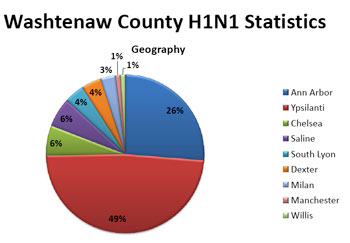
This chart shows the geographic location of H1N1 cases in Washtenaw County, based on 80 residents who were hospitalized. Ypsilanti residents accounted for nearly half of all cases. (Links to larger image)
Torres-Burgos gave a roundup of Washtenaw County data related to the outbreak. There were 80 hospitalizations – of those, 49% were Ypsilanti area residents and 26% were from Ann Arbor. Looking at the cases by race/ethnicity, 69% were Caucasian and 19% African American.
Two adults in Washtenaw County died as a result of H1N1, Torres-Burgos said, but there were no pediatric deaths.
Torres-Burgos recalled the difficulty that the county had in getting adequate vaccines from the federal government. By mid-October, they had an extremely limited supply – an initial shipment of 3,400, all in nasal-mist form, out of a total order of 250,000. [See Chronicle coverage from an Oct. 28, 2009 briefing: "County Revamps H1N1 Vaccine Strategy"]
Based on limited supply, the county initially distributed vaccines based on priority groups. In October, the public health department held three clinics for first-responders, as well as a clinic for priority populations and a mass vaccination clinic. Six additional vaccination clinics were held in November and December. From October 2009 through January 2010, the county administered nearly 13,000 H1N1 vaccines. Through other health care providers, about 163,000 doses were given countywide, according to Torres-Burgos.
Vaccines are still available, she noted. There is no charge for getting them through the public health department.
In describing lessons learned from the outbreak, Torres-Burgos said it was clear that communication was crucial, both through traditional means as well as through social media like Facebook and Twitter. Partnerships were also critical, she said, with health care providers and other key stakeholders like Eastern Michigan University, which let the county use its convocation center for mass clinics.
Funding and staffing are challenges for emergencies like the H1N1 outbreak, Torres-Burgos said. Without federal stimulus funds and the collaboration with partners in the community, the county would have been unable to provide the response needed, she said.
Following her presentation, several commissioners praised the public health department’s response to the H1N1 crisis. Kristin Judge noted that while 400 schools closed throughout the state, there was only one school closing in Washtenaw County. She attributed that to the county’s response in averting a crisis. Barbara Bergman said that the department has laid a strong foundation for responding to future public health crises.
Washtenaw County Public Health Rankings
Dick Fleece, director of the county’s public health/environmental health department, gave a report on how Washtenaw County ranked in a recent study by the University of Wisconsin. The study looked at health outcomes and health factors in counties throughout the U.S. In the first category, Washtenaw ranked 7th in Michigan, looking at outcomes like mortality and morbidity, including low birth weight and quality of life.
Washtenaw County ranked 1st in the state in the health factors category, which measured health behaviors (including smoking rates, obesity rates, binge drinking and teen birth rates), access to health care, social and economic factors, and physical environment. Some highlights:
- Washtenaw ranked highest in the state for the number of primary care providers – 283 per 100,000 population.
- The county’s adult smoking rate is 13%, compared to a statewide rate of 23%. Fleece noted that new state ban on smoking in bars and restaurants takes effect May 1.
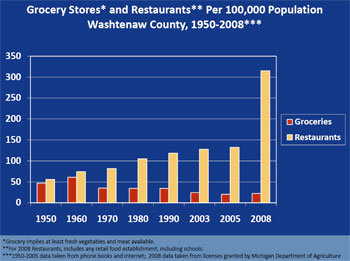
A chart of showing the number of grocery stores and restaurants per capita in Washtenaw County from 1950 through 2008. (Links to larger image)
- In the category of access to healthy foods, 58% of the county’s zip code areas have a grocery store, farmer’s market or produce stand, compared to a statewide average of 51%.
- The county has an estimated 15% rate of uninsured adults under the age of 65, compared to the overall state average of 12%.
- In Washtenaw, 46% of chronically ill Medicare patients were enrolled in hospice care within their last six months of life, compared to a state average of 38%.
- Measuring the birth rate to teen mothers, the county had 14 births per 1,000 females aged 15-19, compared to a state average of 36.
Fleece said that while the county is doing well in many regards and has much to be proud of, there are still problems – as well as areas of disparity. For example, the percentage of adults who smoke varies widely by region, from 9.8% in Ann Arbor to 24.9% in Ypsilanti. Obesity rates are significantly higher in the Ypsilanti area – at 24.9% – compared to 11.2% in Ann Arbor. And looking at adults diagnosed with diabetes, there are large disparities based on race and income, Fleece said.
Another area of concern is the county’s chlamydia rate, at 300 per every 100,000 people. Though it’s lower than the overall state average of 370, it’s far above the target goal of 50, Fleece noted.
The county has a 7.3% rate for low-birth weight – measuring the percent of live births for which the infant weighed less than 5.8 pounds. The state average is 3.7%. Fleece thanked the board for its approval Wednesday evening of a grant – $27,390 from the Genesee County Racial & Ethnic Approaches to Community Health (REACH) – that will be used to address that issue.
The full study results are available at the County Health Rankings website. [.pdf of report to commissioners]
After Fleece’s presentation, Conan Smith said that the ranking bodes well for both residents and for the economy. Having a healthy environment makes the county a place that people want to live and that businesses want to locate. It’s something to brag about, he said, to businesses that might want to invest here.
“And remember to invest in our department as we go forward,” Fleece quipped.
Contract Approved for Next Administrator
With no discussion, commissioners approved an employment agreement with Verna McDaniel to be the county’s next administrator, effective May 15, 2010 with a salary of $155,000. McDaniel, the county’s deputy administrator, was the only person interviewed to replace retiring administrator Bob Guenzel. Guenzel, who has been in that post since 1994, currently earns $159,424.
In addition to her salary, McDaniel will also be provided with a county-owned vehicle, health insurance, travel expenses and other benefits. The agreement states that she’ll be reimbursed for up to $3,000 in other job-related expenses, as needed. [.pdf of employment agreement]
McDaniel has worked for the county for 28 years, including 18 years as executive director of human resources. [For previous Chronicle coverage of McDaniel's selection, see "McDaniel Pledges to Lead Washtenaw."]
Regional Energy Office
Without comment, the board voted to join the Southeast Michigan Regional Energy Office, with commissioner Conan Smith abstaining. Smith had addressed a potential conflict of interest on the issue at the board’s March 3 meeting – he is executive director of the Michigan Suburbs Alliance, a Ferndale-based nonprofit that will be managing the energy office. [See Chronicle coverage from a Nov. 24, 2009 administrative briefing and Dec. 2, 2009 county board meeting.] Commissioners also had received a briefing on the energy office at their March 4 working session.
Present: Barbara Levin Bergman, Leah Gunn, Jeff Irwin, Kristin Judge, Mark Ouimet, Ronnie Peterson, Jessica Ping, Wes Prater, Ken Schwartz, Rolland Sizemore Jr., Conan Smith
Next board meeting: Wednesday, April 7 at 6:30 p.m. at the County Administration Building, 220 N. Main St. The Ways & Means Committee meets first, followed immediately by the regular board meeting. [confirm date] (Though the agenda states that the regular board meeting begins at 6:45 p.m., it usually starts much later – times vary depending on what’s on the agenda.) Public comment sessions are held at the beginning and end of each meeting.
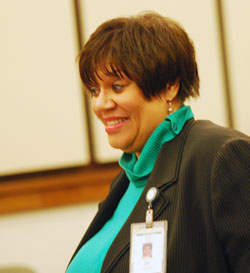
Trenda Rusher, outgoing executive director of the county's Employment Training & Community Services (ETCS) department, gave an emotional speech after receiving a plaque of recognition for her nearly 30 years of service to the county. In starting her own consulting business in the Washington D.C. area, she promised to be the county's "little leprechaun" and help find "pots of gold" – referring to grant funding from the federal government and other sources.
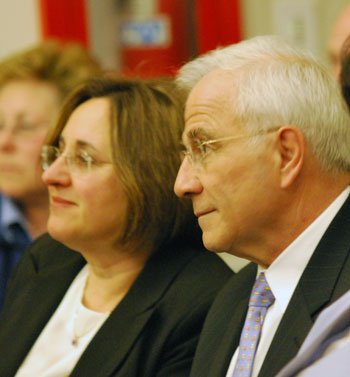
Pete Ballios was recognized by county commissioners for 37.5 years of service to Washtenaw County. He retired as finance director at the end of 2009. To his right is his wife, Theanne Ballios. Commissioner Jeff Irwin said he appreciated the fact that Ballios was someone who could enjoy the "fun moments."



